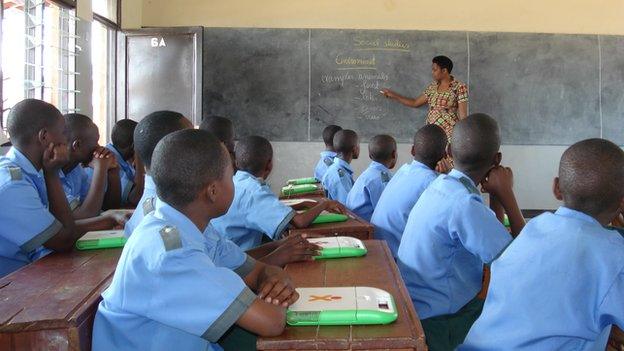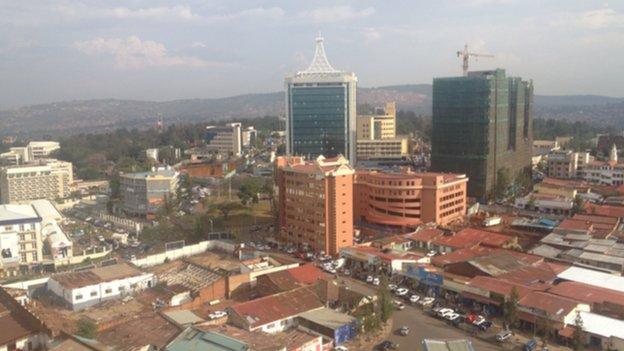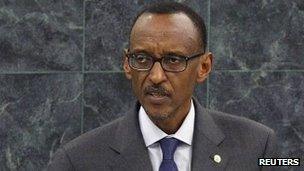Rwanda's IT revolution targets knowledge economy
- Published

The One Laptop Per Child initiative has seen thousands of laptops distributed across Rwandan schools
Olive Uwineza is 12 years old and dreams of becoming president one day. She sits in a class of about 30 pupils, at a high-tech primary school in Kigali, Rwanda.
Each student has a green, white and orange laptop that uses cartoon animations to make lessons more fun.
A lover of maths and science, Olive says tackling these subjects without computers "can make my lessons difficult".
Five years ago, an initiative called One Laptop Per Child (OLPC) was introduced to the school, led by the government and NGOs. It has seen 200,000 laptops distributed in more than 400 schools across this tiny east African nation.
Facilities at Olive's school have been upgraded and modernised, with access to wi-fi, and software tailored for the curriculum.
Healing a nation
The OLPC programme is one of the pillars of Rwanda's Vision 2020, which aims to turn the country into a knowledge-based economy similar to that of Singapore in South East Asia.
Richard Muragijimana works on a bus equipped with computers, teaching people basic IT skills
In the wood-panelled halls of his official office, we meet President Paul Kagame, who has personally been a driver of this vision. He says information technology will help to turn Rwanda into a regional tech hub that will help Rwandans "find jobs, feed their children and regain their dignity".
The tragedy of the 1994 genocide is a strong motivation for President Kagame. In his view, better access to information might have helped victims and perpetrators make different political choices.
For him, the IT revolution is not only about modernising the Rwandan economy - at the core, it's about healing the nation.
Mr Kagame has presided over an era of robust growth in Rwanda. Last year, the economy grew by more than 7%.
Government reforms have encouraged foreign investment and the World Bank has ranked Rwanda the third best country in sub-Saharan Africa in its "Doing Business" index., external
Improving access
But all of this could be undermined by the recent diplomatic tensions with donors. Rwanda has been accused of helping train child soldiers for rebels in neighbouring Democratic Republic of Congo, though it has strongly rejected the allegations.
In October, the US imposed sanctions on Rwanda, which may have an impact on the government's ability to pursue future economic programmes that support Vision 2020.
Undeterred, government agencies continue with their work.
Clare Akamanzi is the chief executive of the Rwanda Development Board, tasked with turning Vision 2020 into tangible social programmes.
She says Rwanda aspires to "evolve from being an agriculture-based economy to a knowledge-based economy, mainly on high value services".

The government aims to provide internet access beyond the capital Kigali
In 2013 a deal was concluded with Korea Telecom to provide 4G technology across the country. At $140m (£87m) this is one of the biggest foreign direct investment deals in Rwanda.
The state has laid 3,000km of fibre-optic cables over the last four years and hopes that 4G will help provide last-mile access to all communities outside of the capital, where internet connectivity is low.
Clare Akamanzi says they are taking additional steps to ensure this happens.
"We've built tele-centres, we've built service points, there's a communal infrastructure where we've put computers," she says.
Rwanda is aiming to become a knowledge-based economy, beginning by providing laptops for schoolchildren.
"We've also used ICT buses where we take mobile buses all over the country so people can just come and learn how to use a computer."
Resisting change?
But new technology isn't working for everyone.
At a grain market on the outskirts of Kigali, traders are buying sorghum from local farmers.
A mobile phone application called e-Soko was given to farmers in 2007. The app is designed to save farmers time and help them find the best deal, by sending automated text messages with the latest market prices.

President Kagame says the IT revolution will help people find jobs and "regain their dignity"
The farmers here, though, say they still prefer the more traditional method of face-to-face bartering.
"When I call with my phone there's that possibility of an interaction," farmer Jean Baptiste Nzabamwita says. "We can bargain and say come, we can raise the price up to this one. But [with] the e-Soko... the prices are not reliable."
This is just one small example of how society can sometimes resist the changes brought about by IT.
Rwanda is still a largely traditional and rural country, therefore attempts to modernise the economy will have to go apace with the needs of the population at large.
So does President Kagame's IT agenda come at the expense of more practical realities like healthcare, housing and rural development?
His answer is simple: "The proof of the pudding is in the eating…. and we've been rewarded by progress."